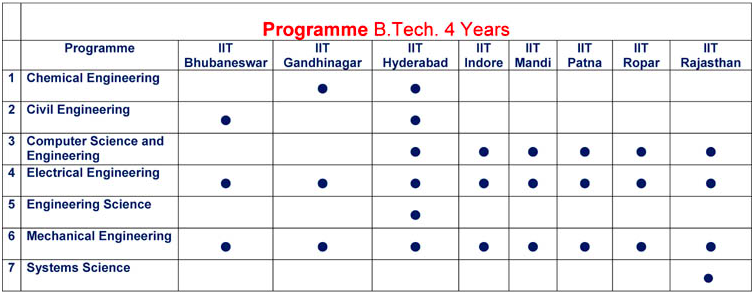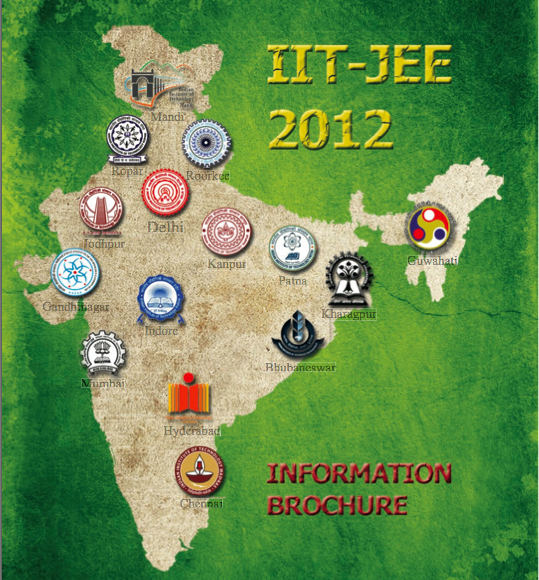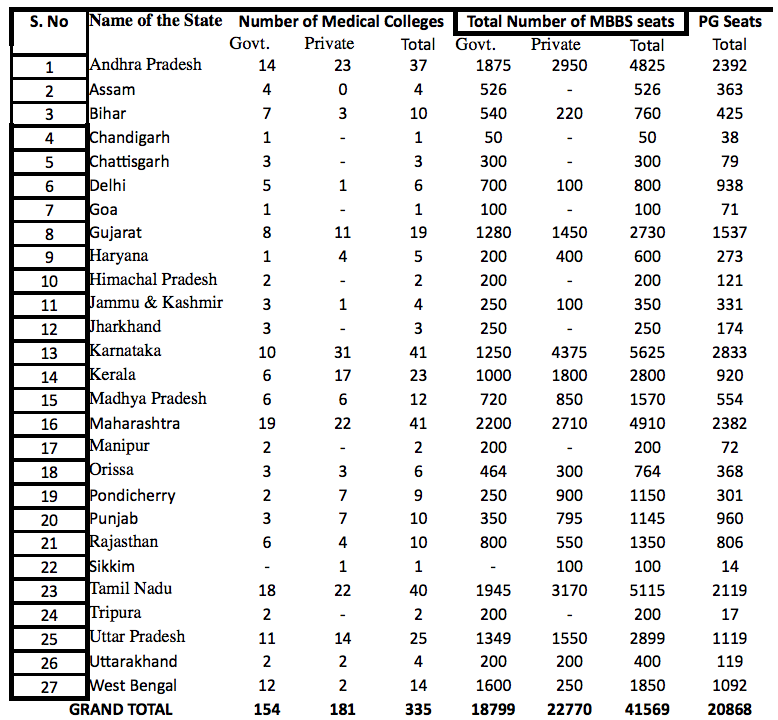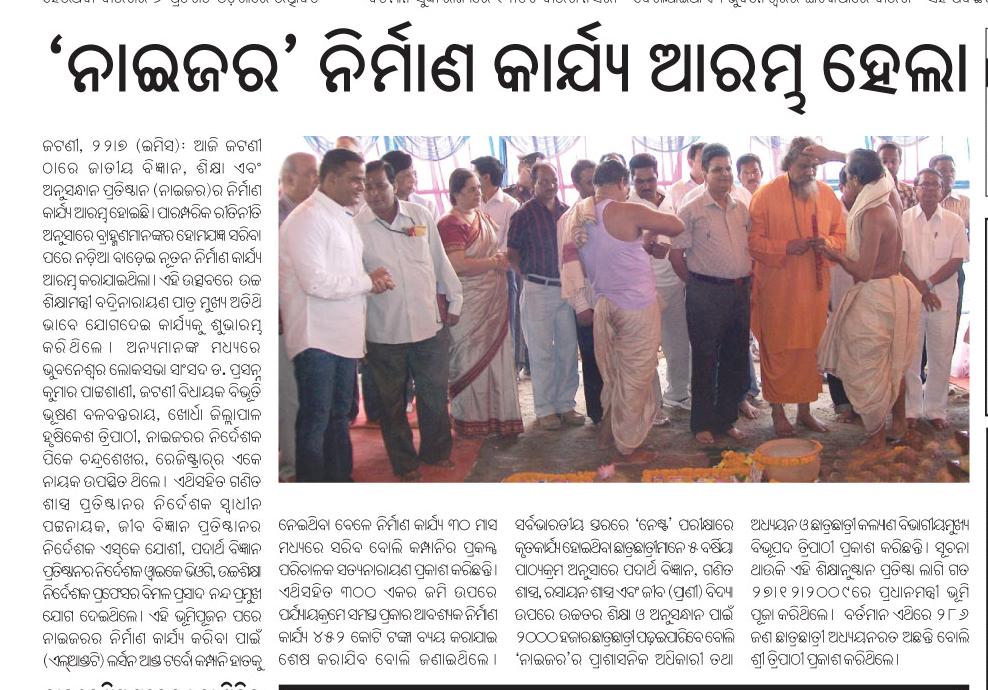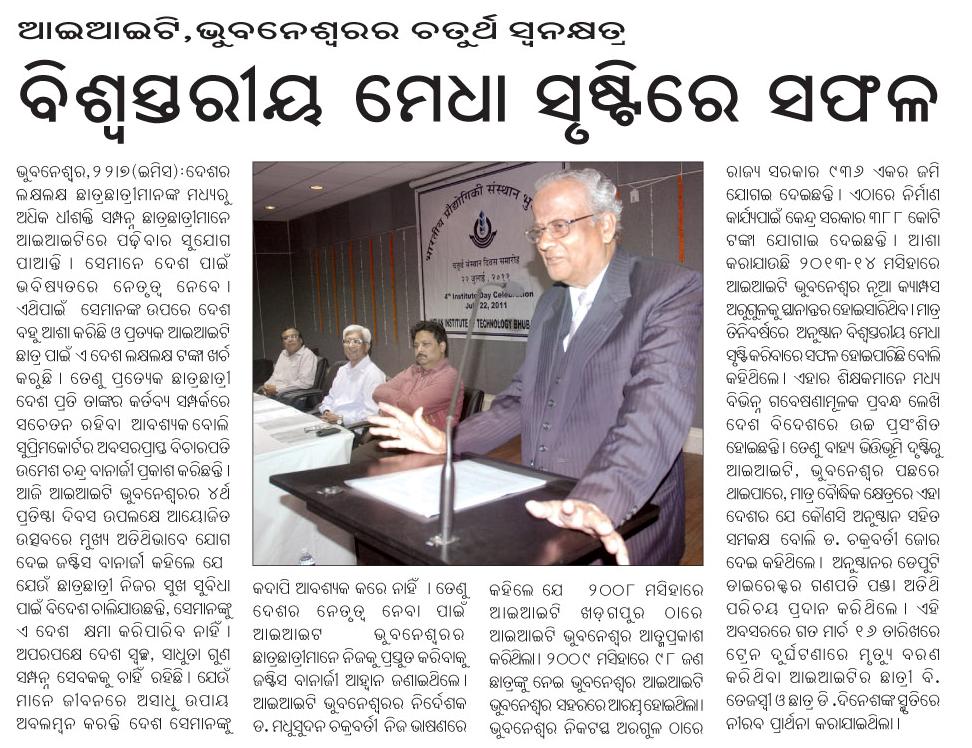The website of this summit is http://www.ficci.com/past-Events-page.asp?evid=20665. Following are excerpts from the press release on Dr. Montek Ahluwalia’s speech.
Inaugurating FICCI Higher Education Summit 2011: Strategies for Expansion in Higher Education in India’, Mr. Ahluwalia said, “The challenge before planners, policy makers and educationists, both in the public and private sector, was of producing world class Indian universities that could be counted in the top 200 rating list.” In the next 20 years we must see a significant number of educational institutions in that category, he declared.
Mr. Ahulwalia also underlined the need to lend an international flavour to Indian universities by inducting international faculty. This would not happen unless the government removes the restriction on employment of international faculty, he said.
For higher education, the 12th Plan objective was expansion, equality of access and excellence. The aim was to raise the gross enrolment ration from the current level of 15 per cent to 30 per cent over the next 15 years. “Expansion of higher education has to be balanced with equality of access, especially for those living in areas where educational institutes did not exist,” he said.
Following are excerpts from the press release on Sam Pitroda’s speech.
Addressing the FICCI Higher Education Summit 2011, Mr. Pitroda said, “Higher education reforms are essential if the nation is to meet the serious challenge of skill shortage that will not allow the economy to grow at 8-10 per cent annually. While many of the recommendations of the National Knowledge Commission are in the process of being implemented, we are waiting for the government to act on the recommendations retailing to reform of higher education.”
“The debate on what needs to be done ought to be over, the time now is to focus on action,” he said and added that “the Bills have already been drafted but none of them have been tabled in or passed by Parliament.”
Mr. Pitroda’s concern found an echo in FICCI President, Mr. Harsh Mariwala’s suggestion that although education continues to be a priority sector during the Twelfth Plan, unless the reform agenda initiated by the Ministry of Human Resource Development in the 11th Plan is carried forward within a stringent timeframe, the demographic dividend of a young population could become a demographic disaster for India as well as the world.
Mr. Mariwala hoped that the Foreign Education Providers’ Bill; Unfair Practices Bill; Tribunal Bill and the Accreditation Bill will be passed in the coming winter session of the Parliament and the National Commission for Higher Education and Research (NCHER) Bill 2010 and Innovation University Bill will be introduced in the winter session of the Parliament. The delay in implementation of the reforms is a serious impediment for the economic development of the country, he said and added that FICCI earnestly urges the political leadership to take cognizance of this fact.
Mr. Pitroda said that the government was creating a US$ 5 billion National Knowledge Network (NKN) which is expected to be ready in about nine months. The network would be a state-of-the-art multi- gigabit pan-India network for providing a unified high speed network backbone for all knowledge related institutions in the country. It would facilitate the building of quality institutions with requisite research facilities and creating a pool of highly trained professionals. The NKN will enable scientists, researchers and students from different backgrounds and diverse geographies to work closely for advancing human development in critical and emerging areas.
Following are excerpts from a report in Chronicle of Higher Education.
Mr. Sibal has said that private participation in higher education must be encouraged, and conference attendees agreed that if the government hopes to reach its goal of sending 30 percent of young people to college, both private and public participation are needed. The challenge, as always, is in weeding out the low-quality operators.
"The public perception of private higher education is in a range," said Montek Singh Ahluwalia, head of India’s Planning Commission, a top government policy-making body. "Many are good, but there is a problem of those not-very-good ones."
Mr. Ahluwalia argued that supply and demand will eventually eliminate the bad actors, but others disagreed.
"It will be difficult to weed them out," said M. Anandakrishnan, head of the Indian Institute of Technology’s Kanpur branch. Because there is more demand than supply, he said, it will take time for stakeholders to make discerning choices.
Another delegate, Sachi Hatakenaka, a British-based education researcher, argued that "private sector growth is good for quantity but not for quality."
… Still, said Mr. Agarwal, the next round of government higher-education planning will focus more on expanding capacity at existing institutions rather than adding new universities.
Some private players were hopeful that the government will look to the private sector more as an ally than an adversary in coming years.
November 16th, 2011
Following is an excerpt from a report in Times of India.
Four top doctors of All India Institute of Medical Sciences (AIIMS) have been chosen as directors for the four upcoming AIIMS prototypes. The Union health ministry has sent a letter to professor of neurology Dr Kameshwar Prasad, professors of medicine Dr S K Sharma and Dr Rita Sood and professor of gastroenterology Dr S K Acharya offering them the coveted posts.
While Dr Prasad has been asked to take over the institute in Raipur, Dr Sharma has been offered the Jodhpur branch, Dr Sood the Rishikesh branch and Dr Acharya the Bhubaneswar branch. All of them have been asked to join on November 1.
… Union health minister Ghulam Nabi Azad said in the Rajya Sabha recently that the medical colleges of these six institutions will be functional by next year. Ministry officials said the colleges would be functional from July, 2012, while the hospitals would be in place by early 2013.
"For the first year of medical education, students don’t require hospital visits. That’s why the colleges will start from next year," an official said.
Each of the six medical colleges – a Rs 10,000-crore project – will have 100 MBBS seats. Each of the hospitals will have 960 beds, including 500 beds for the medical college hospital, 300 beds for speciality/super speciality and 100 beds for ICU/accident trauma.
The Union health ministry has also put three of the best known existing medical institutes – AIIMS, Delhi; JIPMER, Puducherry; and PHI, Chandigarh, in charge of helping the six new institutes stand on their feet. AIIMS, Delhi, has been mentoring the two new institutions in Patna and Bhubaneswar, PGI has been mentoring those coming up in Rishikesh and Jodhpur, while JIPMER has been overseeing the prototypes in Bhopal and Raipur.
"The existing institutes will help the new ones select their faculty, establish their laboratory network, conduct entrance exams and plan their curriculum," an official added.
The web page of the AIIMS New Delhi Department of Gastroenterology is at http://www.aiims.edu/aiims/departments/Gastro/gastrofaculty.htm and lists Prof. Subrat K Acharya as its HOD.
A doctor friend tells me that Prof. Subrat K Acharya did his MBBS from SCB Medical College, Cuttack.
Update: Prof. Acharya did his MBBS from MKCG Medical college; but he was a faculty at SCB medical college before he went to AIIMS New Delhi.
September 20th, 2011
Update: As per this news report the 6 new AIIMS-like institutes are scheduled to start the medical colleges from academic year 2012-13 and hospitals in the year 2013-14.
Following is from a report in Times of India.
With the beginning of construction work of IIT Bhubaneswar (IITBBS) campus on Sunday, work for permanent infrastructure of all three premier central institutes in city fell on track. While work for the campus of National Institute of Science Education and Research (NISER) here started on July 21, infrastructure for AIIMS is at an advanced stage of completion. All three institutes hope their permanent campuses to be functional by 2013.
Chief minister Naveen Patnaik inaugurated the IIT campus construction at Aragul village near Jatni on a 950 acre plot of land. IITBBS director, professor M Chakraborty, said the master plan of the campus has been designed to accommodate 10,000 students, 1,000 faculty members and 1,100 non-teaching employees, besides 1,000 out-sourced support staff. The institute also has plans to construct a research park, he said.
The first phase of work, undertaken by CPWD at an estimated Rs 800 crore, would be limited to hosting a capacity of 2,500 students, 250 faculty members and 300 other employees. Chakraborty hopes the institute will shift to its permanent campus by 2013 end or beginning of 2014.
At the already provided budget of Rs 388 crore, IITBBS would construct a main administrative building, lecture hall and classrooms, a laboratory complex, four academic schools (basic science, electrical, infrastructure and mechanical engineering), central workshop and students’ activity centre. The main building is slated to be a six-storey structure and the other schools of four storey each. The hostels as well as the residential quarters are to be seven-storey buildings, Chakraborty said.
Apart from its city campus, the IIT would also set up an innovation centre for climate change on the Puri-Konark coastline, under the School of Earth Ocean and Climate Sciences, the director said.
Construction of the permanent campus of NISER started on a 300-acre site about a month ago, also near Jatni, on July 21. The Rs 457 crore project would include a prayer hall on the hill top, five schools of different specialties, 11 hostels of 200 capacity each, healthcare centre and guest house, said NISER registrar Abhay Naik.
Work for the AIIMS, which started on 100 acres land at Sijua village in May 2010, is at a stage of about 80% completion, sources said. The proposed 978-bed hospital, under the Pradhan Mantri Swasthya Suraksha Yojana, is supposed to have 15 super speciality and 18 speciality wards.
August 16th, 2011
Today, the 22nd July, is a very auspicious day for us. It is on this day in 2008, the society of IIT Bhubaneswar was registered. Further, the date assumes more significance as we began our academic programme from the city of Bhubaneswar for the first time on 22nd July 2009. I wish to avail this opportunity to congratulate our students, staff, officers and faculty, who all are working as a dedicated team to develop this new IIT, for successfully completing 2 years of existence in the city of Bhubaneswar.
…
Infrastructure:
Temporary Campuses
We started our journey in 2008 from the campus of IIT Kharagpur. As mentioned earlier, we commenced our operation from the city of Bhubaneswar from 22nd July 2009. Currently, we are operating from a number of campuses which include IIT Kharagpur Extension Centre, Toshali Plaza at Satyanagar and Workshop cum laboratory complex near IIT Kharagpur extension Centre. Government of Odisha provided us about one (1) acre of land on which we have already constructed a new workshop cum laboratory complex (22000 sq. meters). The Government of Odisha also provided us two towers of Toshali Bhavan which we have already renovated. In addition IIT Kharagpur has constructed a new 200 capacity Dr. A. N. Khosla Hall of Residence near the Workshop cum Laboratory Complex for the students of this Institute. I must avail this opportunity to thank IIT Kharagpur for constructing the hostel which is of great convenience to us. We are also getting support of some of the sister Institutes like IMMT (CSIR) and Central Tool Room and Training Centre.
The class rooms and the laboratories are in place in our campuses at IIT Kharagpur Extension Centre, Toshali Plaza and the New Workshop cum Laboratory Complex.
IIT Bhubaneswar is well equipped with modern Teaching rooms and Teaching and Research Laboratories. All the class rooms are fitted with Multimedia Projectors, Internet Facilities and Wireless Connectivity. Besides the Normal teaching rooms, The Institute designed and developed three Virtual Class Rooms (VCR) sponsored by National Knowledge Networks (NKN). These rooms facilitate Real time on campus and Off-campus teaching learning process. These rooms are equipped with high end and high resolution equipment to facilitate the real time interaction among the students and teachers of the campus and as well as off campus students and faculty members. These class rooms are connected to the NKN Network by means of a dedicated 1GBPS Leased Lines.
The Government of Odisha has provided us 14 flats at Government Colony, Gajapati Nagar. We are fortunate to have found cooperation from the Housing Complex in SBI Colony Kesura wherein we have hired about 60 HIG 3 bed-roomed flats and few MIG flats for accommodation of our students and faculty. While the 3rd and 4th year male students have been being accommodated in the A. N. Khosla Hall of Residence, we have to accommodate others (all the girl students, research scholars and 1st and 2nd year students) in SBI Colony Kesura, 10 KM away from our academic campus. I may avail this opportunity to put on records my deep appreciation of the students, the staff and faculty who have to commute regularly between their residence and the various academic campuses. I am aware that this is strenuous. But I am sure our students, faculty and staff will accommodate the strains and be a part of the history in the making.
Permanent campus
The Foundation Stone of our campus at Arugul was laid on 12th February 2009. The Government of Odisha has allotted 936 acres of land at Arugul (near Jatni) for developing this new IIT of which we already have taken advanced possession of 598 acres. The Government of Odisha has started construction of 4 lane access road to IIT Campus from the National Highway 5. The work on water supply and electric supply to the campus is also in progress. The power supply systems for construction are virtually ready. The Honourable Chief Minister himself as well as the Chief Secretary of the Sate are taking active interests in the developmental work and are addressing issues that need their constant attention. It may not be out of place to mention that the Government of Odisha has also agreed to provide us 75 acres of land on Puri–Konark coast to set up an Innovation Centre for Climate Change.
Out of total 19 KM, we already have completed construction of 8 Km of boundary wall. About 10 bore wells have been sunk to facilitate construction work. IIT Bhubaneswar has also taken up tree plantation programme for its new campus.
The master plan of the new campus at Arugul for 10, 000 students, 1000 faculty and 1100 supporting staff has been approved and the total construction should be completed in 3 phases in next 12-15 years. The work for land grading, road and other related construction are expected to begin in August 2011. While the Government of India has approved construction of 2, 21,000 sq meter of covered area in the 1st phase, our consultant has already completed conceptual design of 1, 20, 000 sq meters of covered areas for various schools, residential quarters, hostels and other service/administrative buildings based on the availability of fund in the initial phase. Applications for clearance form statutory bodies (e.g. forest, BDA, environment) are under process and such clearance are expected shortly. We expect the tendering process to be over and hope that CPWD would be able to start the construction work by the end of this year or early next year. We are planning to move to our new campus by end 2013 or beginning 2014.
Academics
Academic Schools
IIT Bhubaneswar promotes a borderless academic environment: We have the concept of Schools, rather than Departments. We encourage academic staff and students to work together in an interdisciplinary environment. Initially we had set up the following five (5) schools:
• School of Basic Sciences (Physics, Chemistry, Bioscience, Mathematics)
• School of Humanities, Social Sciences and Management
• School of Mechanical Sciences (Mechanical, Manufacturing & Industrial Engineering, Aerospace Engineering, Naval Architecture)
• School of Infrastructure (Civil Engineering, Architecture, Urban Design, Town Planning, Traffic & Transportation Engineering)
• School of Electrical Sciences (Electrical Engineering, Electronics Communication Engineering, Computer Science and Engineering, Energy, Learning Sciences, Instrumentation)
The Institute has just set up the following two (2) new Schools:
• School of Mineral, Metallurgical and Materials Engineering – Materials, Metallurgy, Mining (Relevant to the Rich Resources of metals and minerals in the region)
• School of Earth Ocean and Climate Sciences (Relevant to the region keeping in view the vast Coast Line, Rich Biodiversity and mineral resources, need for Disaster Management and Mitigation arising out of Flood, Cyclone etc.) As a part of this School, the Institute will set up an Innovation Centre for Climate Change on the Puri-Konark coast line.
The following schools are proposed to be set up in the second phase of our expansion:
•School of Chemical and Biochemical Engineering Chemical, biochemical, biomedical, biotechnology
• School of Design and Creative Arts
Academic Activities
We started our journey with a total of 94 students in three (3) undergraduate programmes namely civil, electrical and mechanical engineering with an intake capacity of 40 each in 2008. We already have introduced Ph. D. programmes from 2009 and have about 35 Research Scholars. We are planning to start our postgraduate (MS/M. Tech.) programmes from July 2012. Currently, we have about 500 students (UG and Ph. D.), 50 full time faculty members 7 officers and 40 supporting staff.
Awards and Honours
We are proud that our Chairman Board of Governors, Professor P. Rama Rao, has received the second highest civilian award “Padma Vibhushan” of the Government of India this year.
Prof. S. C. Datta of the School of Infrastructure was awarded Fulbright-Nehru Sr. Research Fellowship and he visited the University of California at Davies, USA. He has been awarded the prestigious Occasional Lecturer Fund by Council for International Exchange of Scholars, US Department of State, for delivering two invited lectures at University of Massachusetts, Dartmouth, during his Fulbright Grant period in USA. Dr. Sumanta Haldar of the same School received the Prof. Leonard’s best Ph.D. thesis award from Indian Geotechnical Society. Dr. C.S. Bhende of the School of Electrical Science received the best Ph.D. thesis award from Indian National Academy of Engineering.
Mr. Pyari Mohan Pradhan, Mrt. Satyasai Jagannath Nanda and Mr. Vikas Baghel, Research Scholars of the School Electrical Sciences were awarded the Department of Foreign Affairs and International Trade, Government of Canada, “Commonwealth Graduate Student Exchange Programme” fellowship. Dr. Subhransu R. Samantaray of the same School won the Samanta Chandra Sekhar Award for 2010 from Orissa Bigyan Academy for his contribution to Engineering and Technology by Oriya Scientist working in Odisha. Dr D. Sahoo of Humanities, Social Sciences and Management received the Best Paper Award at the International Workshop on Regional Competitiveness and International factors Mobility at Oriens France. Professor M. Chakraborty received the Best Technical Paper Award 2010 from the Indian Foundry Journal of the Institute of Indian Foundrymen.
Mr. Raghav. R, 3rd Year Student of Mechanical Engineering won the All India essay competition for college students conducted by the NGO: Nandini Voice for the Deprived
Publications
Within 2 years of our existence in the city of Bhubaneswar, the faculty members have already contributed to creating new knowledge by publishing about 115 papers in National and International Journals of repute. Besides, 85 papers have been presented in various National and International Conferences in India and Abroad that have made our presence felt all over the world. Our doctoral and undergraduate students have also published a few papers in journals and made presentations in conferences. Our faculty members have also published 17 books/ chapters of books in Humanities, Science and Technology.
Sponsored Projects and Consultancy and Endowment
The Institute already has received a number of sponsored projects from various funding agencies like DST, CSIR and DRDO and consultancy from industries worth more than 320 lakhs.
Industries are coming forward to join us in developing this new IIT. M/s MGM Minerals Group has already established a perpetual “MGM Chair Professor” for the School of Minerals, Metallurgical and Materials Engineering with an endowment of Rs 300 lakhs.
International Collaborations
IIT Bhubaneswar has started collaborative activities with a few Universities abroad. We already have signed MOU for faculty exchange programmes with the University fo Massachusetts at Dartmouth USA, and the University of Western Ontario Canada. Professor Lord S. Kumar Bhattacharyya of the Warwick Manufacturing Group, of the University of Warwick has been appointed as Distinguished Visiting Professor of IIT Bhubaneswar while Professor Richard Dashwood of the same university spent two weeks at IIT Bhubaneswar as visiting Professor in March 2011. Professor Asit K Biswas, President of the Third World Centre for Water Management, Winner of Stockholm Water Prize (2006) has also been appointed as Distinguished Visiting Professor of this Institute.
Workshop/Conferences
The Institute organized a one day workshop “An Academy – Industry Interface” with participation from the Warwick Manufacturing Group, the University of Warwick, UK, IIT Bhubaneswar, Tata Steel, Infosys, IBM, WIPRO, L&T and others on 17th September 2010. Another workshop “Multivariate Statistical Analysis” was organized by the School of Humanities, Social Science and Management on 24th March 2011. The Training and Placement Section had organized a Panel Discussion “Managing Generation Y in workplace – A Challenge to the Indian Industry” on 12th March 2011. The Institute has started organizing “Research Scholars Day” on the National Science Day on 28th February every year.
Summer Internships
Our students have received support from various Universities and Industries in India and Abroad for summer internships. Some of these Universities and Industries abroad are the University of North Texas, Oklahoma State University, University of Massachusetts at Dartmouth, Northern Arizona University in USA, University of Warwick UK, McGill University Canada, University of Cologne Germany, University of Padua Italy, Flanders Mechatronics Centre Belgium, ExTechNa GmbH Switzerland, University of Zacadecas Mexico, Tianjin University China, Ming Chi University Taiwan and University of Technology Malaysia.
… Student Activities
Our Students under the Students Gymkhana are quite active and are organizing various activities. They already have formed several societies like Robotics Society, Entrepreneurship Cell, Dramatic Society, Music Society to name a few. They have been organizing cultural (Alma Fiesta) and Techno-Management (Wiessenaire) festivals successfully with support from many sponsors/industries drawing participations from various colleges/institutions of the country.
July 28th, 2011
